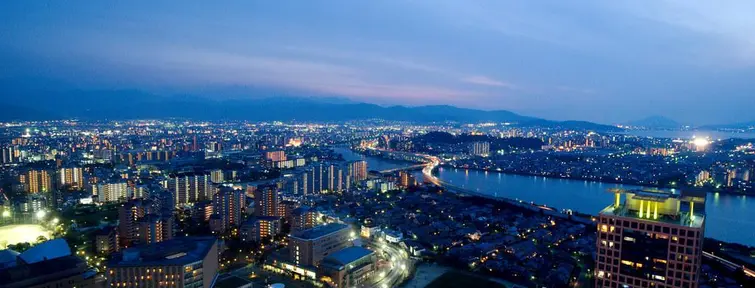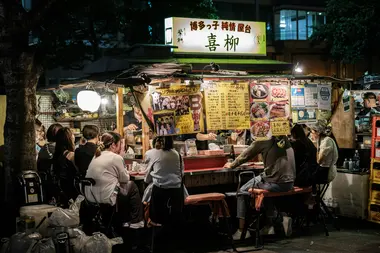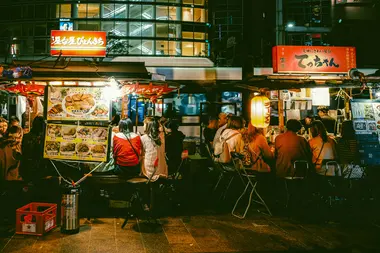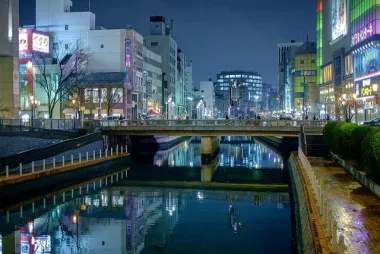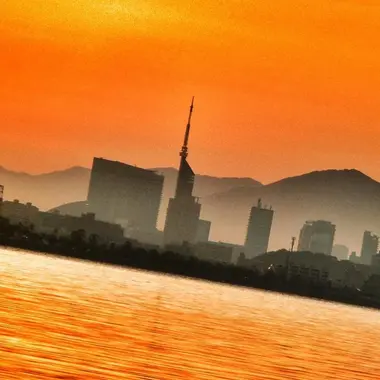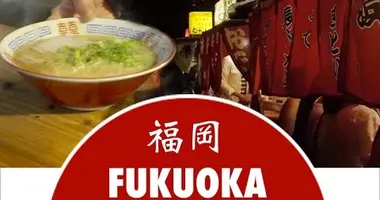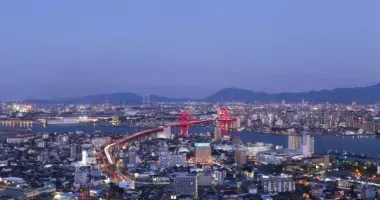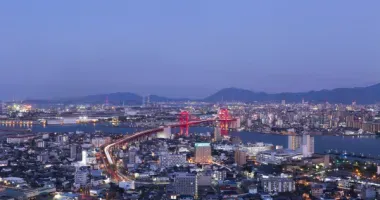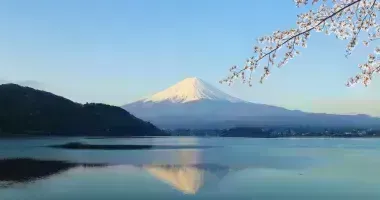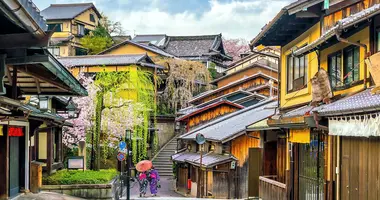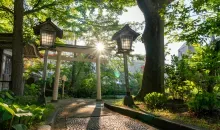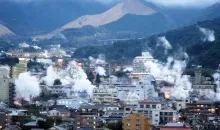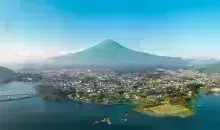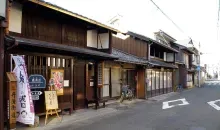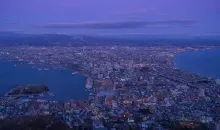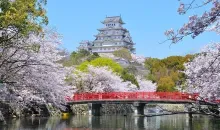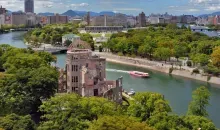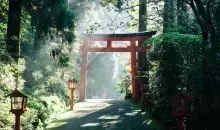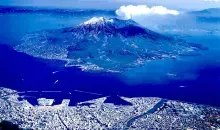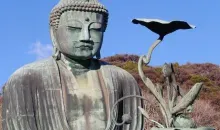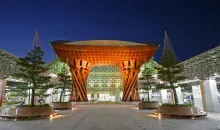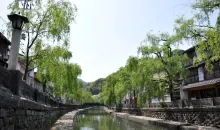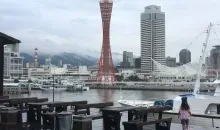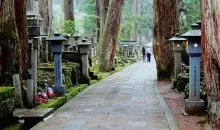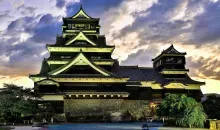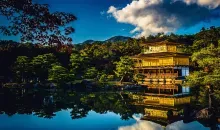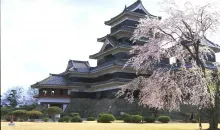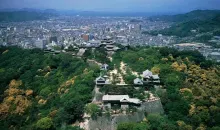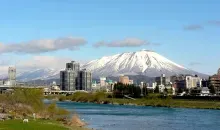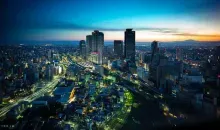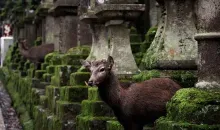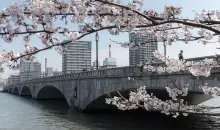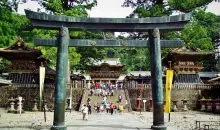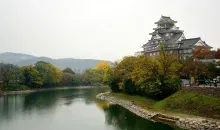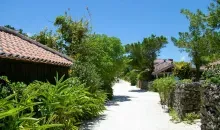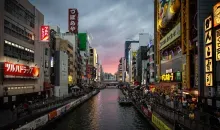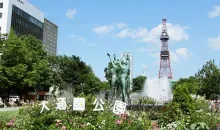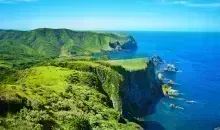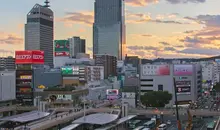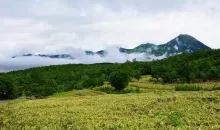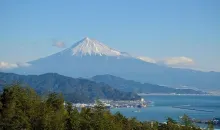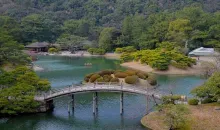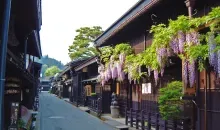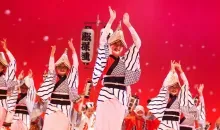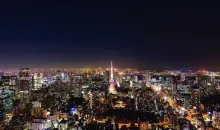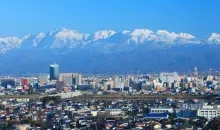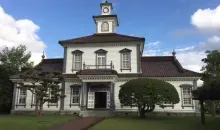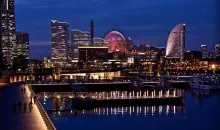Fukuoka
- Pubblicato il : 12/07/2017
- Per : G.L. / J.R.
- Youtube
Local Time 21:59
Symbol : sunny_cloudy
Temp : 4.1°C
Date : Oggi
Symbol : sunny_cloudy
Temp : 2.9°C
Date : Tomorrow
Symbol : sunny_cloudy
Temp : 9.8°C
Date : Sabato
Symbol : cloudy_snowy
Temp : 4°C
Date : Dom
Local Time 21:59
Symbol : sunny_cloudy
Temp : 4.1°C
Date : Oggi
Symbol : sunny_cloudy
Temp : 2.9°C
Date : Tomorrow
Symbol : sunny_cloudy
Temp : 9.8°C
Date : Sabato
Symbol : cloudy_snowy
Temp : 4°C
Date : Dom
Fukuoka, la capitale del sud
Fukuoka, la città più grande dell'isola di Kyushu, offre un'esperienza unica che unisce tradizione e modernità. Situata sulla costa settentrionale dell'isola, questa dinamica città di oltre 1,5 milioni di abitanti ha forgiato la sua identità attraverso secoli di scambi commerciali con i suoi vicini asiatici. Storica porta d'ingresso per le influenze straniere in Giappone, Fukuoka ha introdotto il sistema di scrittura cinese e il buddismo nel IV secolo. Oggi, questa città vivace e soleggiata , dal clima mite, offre un'autentica immersione nel Giappone contemporaneo, con il suo ricco patrimonio culturale, i suoi vivaci quartieri e la sua rinomata gastronomia.
Luoghi da non perdere nel centro di Fukuoka
Nel cuore di Fukuoka si trova il quartiere di Hakata, un vero e proprio conservatorio di tradizioni locali. Un tempo città mercato separata, Hakata si è fusa con la città signorile di Fukuoka nel 1889, ma è rimasta il centro nevralgico della città.
Lastazione di Hakata è oggi il punto focale della città e un importante nodo di trasporto per il resto di Kyushu. Per capire la storia e le tradizioni locali, non perdete il Museo popolare di Hakata Machiya, dove vengono spiegati l'artigianato, il festival di Hakata Gion e persino lo slang locale.
Esplorate anche Tenjin, il centro degli affari che ospita anche santuari e un'importante area commerciale. Nelle vicinanze, il quartiere alla moda Daimyo attira una clientela più giovane con le sue boutique di design e i suoi caffè alla moda. Per chi è interessato alle tradizioni, il quartiere di Gion ospita numerosi tesori storici. Gli amanti del mare possono recarsi a Momochihama, dove si trovano sia la Torre di Fukuoka che una grande spiaggia, particolarmente popolare in estate.
Per scoprire la città al meglio, consultate la Top 10 di Fukuoka del nostro Travel Angel, che vi guiderà alla scoperta dei siti imperdibili con consigli da insider.
Cultura yatai: un'esperienza gastronomica unica
Fukuoka è famosa in tutto il Giappone per la sua cultura culinaria unica degli yatai, le bancarelle di cibo di strada che animano le serate della città. Situati principalmente in due zone - Tenjin e l'isola di Nakasu - questi piccoli ristoranti di strada possono ospitare una decina di persone e offrono un'esperienza conviviale incomparabile, in cui abitanti e turisti si incontrano davanti a piatti deliziosi.
Città di mercanti come Osaka, Fukuoka ha un'identità culinaria molto forte, nota soprattutto per i suoi râmen. La specialità locale è l'hakata râmen (o tonkotsu râmen), preparato con un ricco brodo di ossa di maiale che gli conferisce un sapore particolarmente gustoso. Il posto migliore per provare questi deliziosi noodles è senza dubbio uno dei tanti yatai che costeggiano il fiume nel quartiere di Nakasu. Sedetevi su uno sgabello davanti a queste piccole bancarelle e lasciatevi trasportare dall'atmosfera allegra!
Spazi verdi e siti storici
Fukuoka si distingue per i suoi numerosi spazi verdi, che offrono una gradita pausa dal trambusto della città. Il Parco Ohori, il polmone della città, è costruito intorno a un grande lago e offre una popolare passeggiata di 2 km. Da non perdere il tradizionale giardino giapponese nella parte meridionale, un'oasi di pace particolarmente incantevole. Gli appassionati di barche e pedalò possono godersi il lago, mentre le famiglie apprezzeranno le aree gioco.
Nelle vicinanze si trova il Parco Maizuru, che ospita i resti del Castello di Fukuoka. Sebbene dell'antica fortezza feudale siano rimasti solo i bastioni e alcuni edifici, il sito offre un'eccezionale vista panoramica a 360 gradi della città, ideale per ammirare il tramonto. Il parco è anche uno dei luoghi migliori per osservare la fioritura dei ciliegi e dei prugni, a seconda della stagione.
Per un'esperienza più intima, il giardino Yusentei vi affascinerà con il suo piccolo lago, l'elegante casa da tè e l'atmosfera tranquilla. Leggermente decentrato, questo gioiello è considerato il più bel giardino giapponese di Fukuoka ed è particolarmente splendido in autunno.
Sul fronte storico, non perdete il santuario Kushida, simbolo della città e sede del festival Hakata Gion Yamakasa, il tempio Tocho-ji con la sua grande statua di Buddha in legno e la pagoda a cinque piani, e lo Shofuku-ji, il primo tempio Zen del Giappone fondato nel 1195.
Moderni quartieri dello shopping
Fukuoka è rinomata per i suoi quartieri commerciali dinamici e all'avanguardia. Il complesso commerciale Canal City, con la sua architettura neofuturistica e il piccolo canale che attraversa il piano terra, è una tappa obbligata. Questa "città nella città" è ricca di negozi, ristoranti, cinema e luoghi di intrattenimento. Il Ramen Stadium, dedicato ai famosi noodles locali, attira molti buongustai.
Il quartiere Tenjin è il principale centro commerciale di Fukuoka, con grandi magazzini lungo le arterie principali e centri commerciali sotterranei. Accanto, il quartiere Daimyo, alla moda, è un labirinto di stradine dove i giovani locali vengono a passeggiare nei fine settimana, curiosando tra boutique di stilisti, negozi di seconda mano e caffè alla moda.
Per chi cerca souvenir tradizionali, la galleria commerciale Kawabata Shôtengai, a pochi passi dal santuario di Kushida, offre un'esperienza più autentica. In questa via commerciale coperta si possono acquistare oggetti di artigianato tipico come tè, kimono e oggetti di carta giapponese.
Da non perdere il quartiere Nakasu, particolarmente vivace di notte con i suoi numerosi ristoranti, bar e club. La torre di Fukuoka, alta 234 metri, offre un'impressionante vista panoramica sulla città e sulla baia. Infine, l'edificio ACROS, con la sua imponente facciata verde e il giardino terrazzato, è un perfetto esempio di architettura ecologica urbana.
Nanzoin e il suo Buddha gigante: un'escursione spirituale
A soli 30 minuti di treno da Fukuoka si trova uno dei siti spirituali più impressionanti del Giappone: il tempio di Nanzoin a Sasaguri. Questo vasto complesso di templi e santuari è famoso per ospitare la più grande statua di Buddha reclinato in bronzo del mondo. Quest'opera colossale, completata nel 1995, è lunga 41 metri, alta 11 metri e pesa ben 300 tonnellate.
La storia di questa statua è affascinante: fu costruita per ospitare le ceneri di Buddha e di due suoi discepoli, donate al tempio dal Myanmar e dal Nepal in segno di gratitudine per l'assistenza medica fornita ai bambini di quei Paesi. Le dimensioni della statua sono davvero impressionanti quando ci si trova ai suoi piedi, le cui piante sono magnificamente decorate con motivi dorati.
Oltre al grande Buddha, la tenuta di Nanzoin è suddivisa in diverse aree che meritano di essere esplorate. Qui si trova un'imponente statua di Fudô Myôô (Acala), una divinità iraconda associata al fuoco, circondata da 500 statue di discepoli, tutte diverse tra loro. Il sito comprende anche numerosi piccoli templi, santuari e statue sparsi per la collina, creando un incantevole viaggio spirituale in mezzo al verde.
Questo tempio è il punto di partenza del pellegrinaggio degli 88 templi di Sasaguri, una versione più compatta del famoso pellegrinaggio di Shikoku. L'ingresso al sito è gratuito, anche se è previsto un costo di 500 yen per visitare l'interno del Buddha. Lasciate almeno 2 ore per esplorare adeguatamente questo complesso unico, che offre una profonda esperienza spirituale in un ambiente naturale incontaminato.
Esplorare i dintorni: Karatsu, Dazaifu e la costa di Itoshima
La regione intorno a Fukuoka è ricca di destinazioni affascinanti, facilmente accessibili per gite di un giorno. Dazaifu, l'antica capitale amministrativa di Kyushu per cinque secoli, è un punto di forza storico e culturale. Qui si trova il santuario Dazaifu Tenmangu, dedicato al dio dell'apprendimento, circondato da 6.000 alberi di prugne che alla fine dell'inverno danno vita a un magnifico spettacolo. Merita una visita anche il Museo Nazionale di Kyushu, con le sue collezioni di arte e storia.
La penisola diItoshima, a ovest di Fukuoka, è una destinazione popolare per il suo spettacolare scenario costiero. Con le sue spiagge di sabbia bianca, le acque turchesi e le pittoresche formazioni rocciose come il torii galleggiante di Futamigaura, questa regione offre un ambiente idilliaco per gli amanti della natura. In inverno, non perdetevi i kaki-gôya, le capanne di paglia dove potrete gustare ostriche alla griglia in riva al mare. La cascata di Shiraito e i numerosi caffè dal fascino rustico completano il fascino di questa regione.
Karatsu, una piccola città costiera con un pittoresco castello affacciato sul mare, vi conquisterà con la sua atmosfera tranquilla e la sua ricca storia. Sebbene sia stato ricostruito, il castello offre ancora una vista mozzafiato sulla baia. La città è anche rinomata per la tradizionale ceramica Karatsu-yaki e per il suo gigantesco festival di carri allegorici che si tiene a novembre.
Altre destinazioni interessanti sono Yanagawa, soprannominata la "Venezia di Kyushu" con i suoi canali navigabili, e l'isola di Ainoshima, nota come "Isola dei gatti". Per gli amanti della spiritualità, il tempio delle rane Nyorin-ji (Kaeru-dera) offre un'esperienza insolita con le sue migliaia di rappresentazioni di batraci.
Informazioni pratiche: trasporti, alloggio e budget
Fukuoka ha un'ottima accessibilità e una rete di trasporti efficiente. L 'aeroporto di Fukuoka è straordinariamente vicino al centro della città, a soli 5 minuti di metropolitana dal terminal nazionale. Se viaggiate da Tokyo, lo shinkansen Tokaido-Sanyo collega la stazione di Tokyo a quella di Hakata in circa 5 ore. Da Osaka, lo shinkansen Sanyo impiega circa 2 ore e 30 minuti e da Hiroshima solo 1 ora e 10 minuti. Ordinate i biglietti del treno per Fukoaka in anticipo per approfittare della migliore disponibilità.
Il modo più comodo per spostarsi a Fukuoka è la metropolitana, con tre linee: la linea Kuko (arancione), la linea Hakozaki (blu) e la linea Nanakuma (verde). I biglietti costano tra 210 e 380 ¥, a seconda della distanza. Gli abbonamenti giornalieri o per due giorni sono disponibili a 640 o 740 yen. Una fitta rete di autobus completa l'offerta di trasporto pubblico. Se volete esplorare la zona di Kyushu da soli, non esitate a noleggiare un'auto.
Per quanto riguarda gli alloggi, Fukuoka offre una vasta gamma di opzioni. Per sfruttare al meglio il vostro soggiorno, optate per il quartiere di Hakata, tra la stazione e il fiume Naka, o per la zona di Tenjin. Queste zone centrali consentono di raggiungere facilmente le principali attrazioni e la vita notturna senza doversi preoccupare dei trasporti. Il budget per gli hotel è generalmente più abbordabile rispetto a Tokyo o Kyoto, con opzioni che vanno dai capsule hotel economici agli hotel di lusso.
Per quanto riguarda il budget, Fukuoka è rinomata per il suo cibo eccellente e conveniente. Una ciotola di râmen può costare anche solo 280 yen in alcuni locali e gli yatai offrono piatti gustosi a prezzi ragionevoli. Ma assicuratevi di controllare i prezzi prima di ordinare, soprattutto negli yatai dove i prezzi non sono esposti. La città offre quindi un ottimo rapporto qualità-prezzo per i viaggiatori, rendendola una destinazione interessante per scoprire la cultura giapponese senza spendere troppo.
Tutti nostre attività
Tutti nostri Tour
Interessato da Fukuoka
Scopri altre città da esplorare
